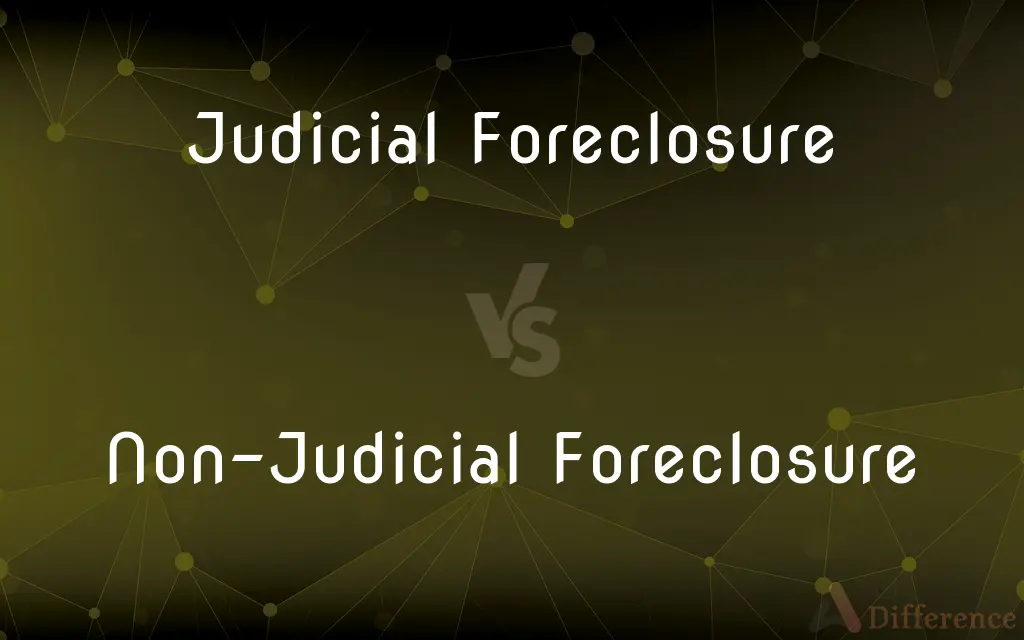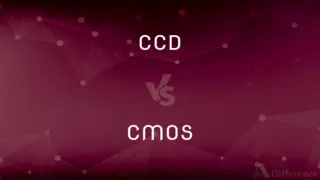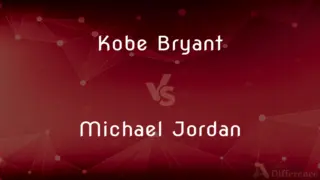Judicial Foreclosure vs. Non-Judicial Foreclosure — What's the Difference?
By Tayyaba Rehman & Fiza Rafique — Published on February 15, 2024
Judicial foreclosure involves court proceedings to repossess and sell a property due to loan default, while non-judicial foreclosure allows the lender to sell the property without court intervention, based on a "power of sale" clause in the mortgage.

Difference Between Judicial Foreclosure and Non-Judicial Foreclosure
Table of Contents
ADVERTISEMENT
Key Differences
Judicial foreclosure and non-judicial foreclosure are two distinct processes used by lenders to recover the balance of a loan from a borrower who has defaulted on their mortgage payments. Judicial foreclosure is a legal process that requires the lender to file a lawsuit against the borrower to obtain a court order to foreclose on the property. This process is used in states where a court's involvement is necessary to foreclose on a property, providing an opportunity for the borrower to be heard in court. Judicial foreclosures can be lengthy and costly due to the legal proceedings involved.
Non-judicial foreclosure, on the other hand, does not involve court proceedings. Instead, it is carried out based on the "power of sale" clause in the mortgage or deed of trust, which pre-authorizes the sale of the property to pay off the loan balance in the event of the borrower's default. This process is faster and less expensive than judicial foreclosure, as it bypasses the legal system, but it offers fewer protections to the borrower. Non-judicial foreclosures are permitted in states with specific statutes that allow this process.
The choice between judicial and non-judicial foreclosure largely depends on the state's laws where the property is located and the terms of the mortgage agreement. Judicial foreclosure provides a legal avenue for borrowers to contest the foreclosure and potentially present defenses, which can delay the process. Non-judicial foreclosure, while quicker, leaves the borrower with limited options to challenge the foreclosure, often requiring them to initiate legal action to stop the process.
Both types of foreclosure ultimately aim to allow the lender to recover the unpaid loan amount by selling the property. However, the implications for the borrower, the timeline, and the procedural requirements differ significantly between judicial and non-judicial foreclosures, making it important for borrowers and lenders to understand the specific laws and processes in their jurisdiction.
In summary, while both judicial and non-judicial foreclosures serve the same purpose of enabling lenders to address loan defaults, they differ in their processes, borrower protections, and the legal and financial implications for all parties involved.
ADVERTISEMENT
Comparison Chart
Court Involvement
Requires court proceedings
No court involvement; based on "power of sale" clause
Process Duration
Longer due to legal proceedings
Shorter, as it bypasses the courts
Borrower Protections
Provides an opportunity for defense in court
Limited options to contest foreclosure
Cost
Generally more expensive due to legal fees
Less expensive due to lack of court fees
Usage
Used in states requiring judicial process
Used in states with specific statutes allowing it
Compare with Definitions
Judicial Foreclosure
Involves filing a lawsuit to obtain a foreclosure.
Judicial foreclosure begins with the lender filing a legal complaint.
Non-Judicial Foreclosure
Based on a power of sale clause in the mortgage.
The deed of trust's power of sale clause allowed for non-judicial foreclosure.
Judicial Foreclosure
Predominant in states without power of sale laws.
In our state, lenders must pursue judicial foreclosure to reclaim properties.
Non-Judicial Foreclosure
Offers limited opportunities for borrowers to contest.
The homeowner sought legal advice to challenge the non-judicial foreclosure.
Judicial Foreclosure
Results in a court-ordered auction of the property.
The property was sold at an auction following the judicial foreclosure ruling.
Non-Judicial Foreclosure
Common in states with specific enabling statutes.
Our state's laws favor non-judicial foreclosure for expediency.
Judicial Foreclosure
A foreclosure process requiring court action.
The bank initiated a judicial foreclosure against the defaulting homeowner.
Non-Judicial Foreclosure
Typically faster and less costly than judicial foreclosure.
Non-judicial foreclosure was completed within a few months.
Judicial Foreclosure
Allows borrowers to present a defense in court.
The homeowner contested the judicial foreclosure during the court hearing.
Non-Judicial Foreclosure
Foreclosure process without court intervention.
The lender proceeded with a non-judicial foreclosure due to loan default.
Common Curiosities
Are judicial foreclosures public record?
Yes, since they involve court proceedings, they are part of the public record.
What happens if a non-judicial foreclosure is contested?
The borrower must usually file a lawsuit to challenge the foreclosure.
Can a lender choose between judicial and non-judicial foreclosure?
It depends on the state laws and the terms of the mortgage agreement.
Can a borrower stop a judicial foreclosure?
Yes, by presenting a valid defense in court or settling the debt.
Do all states allow non-judicial foreclosure?
No, some states require all foreclosures to go through the judicial process.
Which is faster, judicial or non-judicial foreclosure?
Non-judicial foreclosure is typically faster due to the lack of court proceedings.
Does judicial foreclosure always result in a property auction?
Most judicial foreclosures end in a public auction, but outcomes can vary.
What is a "power of sale" clause?
It's a clause in a mortgage or deed of trust allowing the lender to sell the property upon default without court intervention.
What protections do borrowers have in non-judicial foreclosure?
Protections are limited, but borrowers can seek legal avenues to contest or delay the process.
How does a borrower know which foreclosure process will be used?
It's typically outlined in the mortgage or deed of trust and governed by state law.
Can a judicial foreclosure become a non-judicial foreclosure?
Generally, the process is determined at the outset based on state law and the loan agreement.
Can a borrower reinstate the loan during a judicial foreclosure?
Many states provide a right of reinstatement during the foreclosure process.
How can borrowers avoid foreclosure?
By communicating with the lender to modify the loan, establish a repayment plan, or explore other loss mitigation options.
What is a deficiency judgment in foreclosure?
It's a judgment against the borrower for the balance owed if the foreclosure sale doesn't cover the loan amount.
Is non-judicial foreclosure less expensive for the lender?
Yes, because it avoids court fees and extensive legal processes.
Share Your Discovery

Previous Comparison
CCD vs. CMOS
Next Comparison
Kobe Bryant vs. Michael JordanAuthor Spotlight
Written by
Tayyaba RehmanTayyaba Rehman is a distinguished writer, currently serving as a primary contributor to askdifference.com. As a researcher in semantics and etymology, Tayyaba's passion for the complexity of languages and their distinctions has found a perfect home on the platform. Tayyaba delves into the intricacies of language, distinguishing between commonly confused words and phrases, thereby providing clarity for readers worldwide.
Co-written by
Fiza RafiqueFiza Rafique is a skilled content writer at AskDifference.com, where she meticulously refines and enhances written pieces. Drawing from her vast editorial expertise, Fiza ensures clarity, accuracy, and precision in every article. Passionate about language, she continually seeks to elevate the quality of content for readers worldwide.
















































